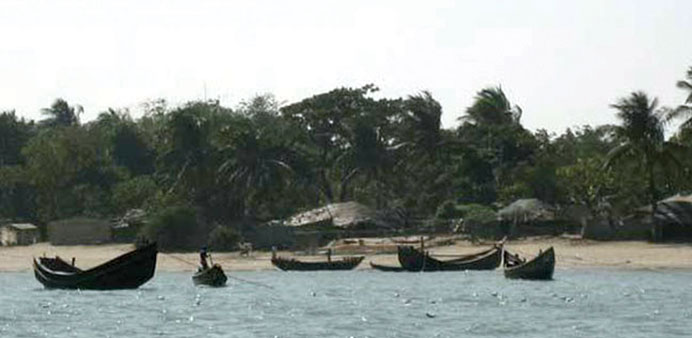AFP
Shah Porir Dwip
Fringed with coconut trees and sandy beaches, Bangladesh’s near-deserted island of Shah Porir Dwip feels more like a sleepy fishing port than a launchpad for a multi-million-dollar people
smuggling industry.
But while the shores are still lined with wooden fishing boats, the crews are nowhere to be seen and the nets have seen little action of late.
“They all used to be boatmen or fishermen but gradually they realised how lucrative human trafficking is, so they became middlemen or traffickers themselves,” said local police officer Kabir Hossain on a tour of the island, the rolling hills of neighbouring Myanmar visible on the horizon.
“More than 60% of the people living here are now either directly or indirectly involved with trafficking,” Hossain
added.
Activists estimate up to 8,000 migrants may presently be at sea in Southeast Asia. Most of them are ethnic Rohingya, heading south from Bangladesh or Myanmar to wealthier
countries such as Malaysia.
But growing numbers of Bangladeshis are also trying to make the trip themselves, forking out up to $3,000 for a place on rickety and overcrowded trawlers that often fail to reach their destination.
In doing so, they are fuelling a trade that offers riches far outweighing the money that can be legally earned from fishing.
Shah Porir Dwip, which is accessible from the Bangladeshi mainland at low tide, carries tell-tale signs of new wealth.
Nearly all the houses are built out of brick and concrete rather than mud or straw as in towns further inland. Many appear to be freshly painted.
Hossain was one of the few men on the streets, locals having fled in droves to avoid raids by security forces sparked by the recent discovery in Thailand of mass graves containing the remains of migrants from Bangladesh and Myanmar.
More than 90 suspected human smugglers were arrested from Shah Porir Dwip and an adjoining village during the raids and they are now being held on remand.
Three alleged smuggling kingpins were also shot dead during the crackdown, all of them from Shah Porir Dwip.
Normally home to around 12,000 people, the island has become something of a ghost town since the elite Rapid Action Battalion set up a checkpoint on the island and other agencies raided homes.
A handful of elderly men who were milling around on the streets all refused to speak to an AFP reporter although one teenager, who was waiting to go fishing, did let slip that his was one of the few boats that aimed to return fuller than when
setting sail.
“I’ve heard that people are being taken out in the fishing boats to the ships which are anchored in deep-sea,” said Mahmud Hossain.
Police and other observers have identified scores of launchpads from where the migrants begin their journey, all in the Cox’s Bazar district of southern Bangladesh that
borders Myanmar.
While only around a dozen migrants get into the initial fishing boats, the larger vessels that then head towards Southeast Asia are usually jam-packed with hundreds on board.
A UN official based in Cox’s Bazar said the smuggling trade took off in 2001 when the first Rohingya attempted to reach Thailand and Malaysia by sea. Bangladeshis, wanting a better life, started making the same journey around five years later.
“It’s become one of the most profitable of all forms of organised crime,” said the official, who has been working with the Rohingya for many years and spoke on condition of
anonymity.
While Bangladeshi police don’t have figures on the number of sailings, their record of arrests point to the scale of the recent increase.
While only 132 people were arrested in 2012 as they tried to travel illegally to Malaysia, that figure jumped to 1,550 in 2014.
The alleged kingpins who were shot dead included Dholu Hossain, whom police say smuggled more than 1,000
refugees.
Locals whisper that Hossain was shielded by a lawmaker, fuelling suspicions that officials have turned a blind eye for a cut of the profits.
Calls to a host of smugglers who have previously been willing to speak to journalists went unanswered, highlighting their fears that phones are now
being tapped.
Mujibur Rahman, a police detective, said cops who monitored the phone and bank activity of one suspected smuggler found some 3.1mn Bangladeshi taka ($40,000) had been paid into her account in six months. The woman is now in custody.
Despite the newfound push to combat people smuggling, the authorities face an uphill task in reining in the trade in the
long-term.
“There are around 9,000 fishing vessels plying the seas off Cox’s Bazar, mostly unlicensed. It’s very hard for the authorities to trace them once they are out at sea,” the UN
official said.
“If a crime such as people trafficking can’t be detected and halted on land then the chances of it being prevented out at sea are even less.”
Deserted boats at Shah Porir Dwip, which is accessible from the Bangladeshi mainland at low tide.

